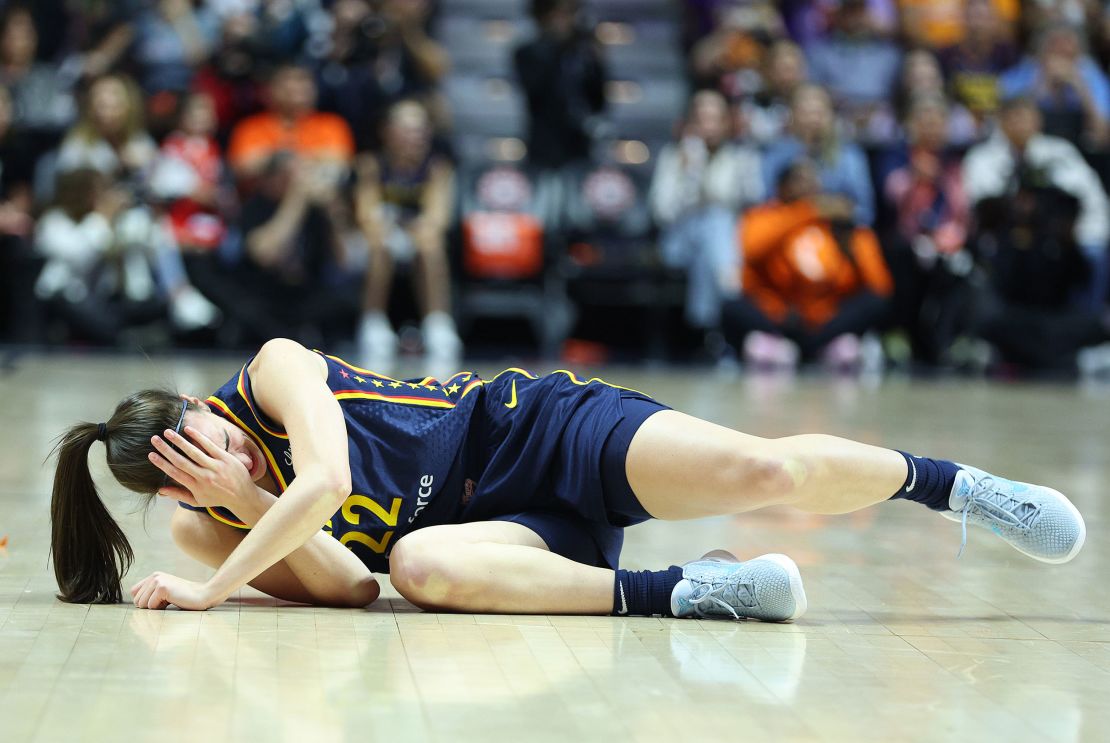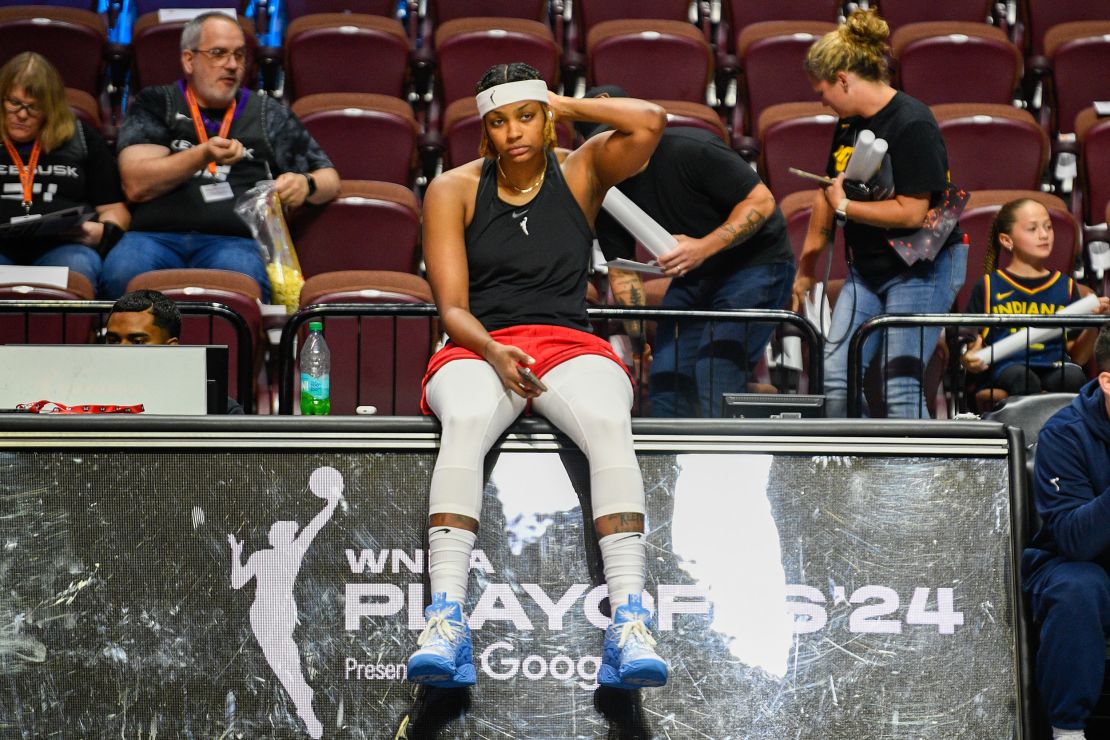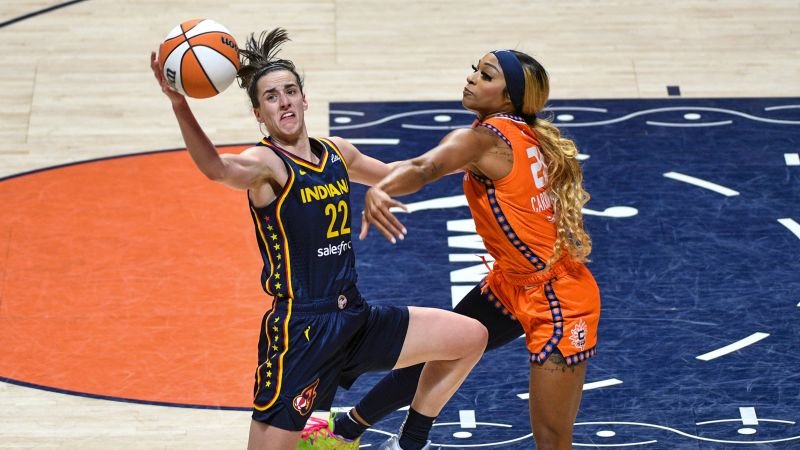Editor’s Note: The following passage is adapted from “On Her Game: Caitlin Clark and the Revolution in Women’s Sports” by Christine Brennan, releasing on Tuesday, July 8. Copyright © 2025 by Christine Brennan. Adapted for excerpt with permission from Scribner, a division of Simon & Schuster, Inc.
CNN
—
Little more than 36 hours after the Indiana Fever’s season ended, at 1:41 p.m. Eastern on Friday, September 27, the Women’s National Basketball Players Association posted a lengthy statement on social media:
A MESSAGE ON BEHALF OF THE 144
This week was dedicated to celebrating and amplifying A’ja, Caitlin, DiJonai, and Napheesa for their hard work and truly exceptional performances all season long. We were not going to distract from their successes, nor would we dim the glow of the spotlight that centered them. They have earned that focus and celebration. But we will take this moment now to stand up for them and the rest of our members. Every single one of them.
Because we call B.S.
To unprofessional members of the media like Christine Brennan:
You are not fooling anyone.
That so-called interview in the name of journalism was a blatant attempt to bait a professional athlete into participating in a narrative that is false and designed to fuel racist, homophobic, and misogynistic vitriol on social media.
You cannot hide behind your tenure.
Instead of demonstrating the cornerstones of journalism ethics like integrity, objectivity, and a fundamental commitment to truth, you have chosen to be indecent and downright insincere. You have abused your privileges and do not deserve the cre- dentials issued to you. And you certainly are not entitled to any interviews with the members of this union or any other athlete in sport. Those credentials mean that you can ask anything, but they also mean that you know the difference between what you should and should not.
We see you.
Our relationship with the media is a delicate one that we will continue to strengthen because the media is essential to growing the game. No one knows that better than we do. But the players are entitled to better. They are entitled to professionalism.
We call on USA Today Network to review its Principles of Ethical Conduct for Newsrooms and address what we believe is a violation of several core principles, including seeking and reporting the truth. USA Today Sports should explain why a reporter with clear bias and ulterior motives was assigned to cover the league. We also urge the league to review its policies and take measures to prevent such issues, protecting the integrity of the game and its players.
Terri Carmichael Jackson
Executive Director
•
Two hours later, USA Today took its turn posting on social media.
Journalists ask questions and seek truth. At USA Today, our mission is to report in an unbiased manner. We reject the notion that the interview perpetuated any narrative other than to get the player’s perspective directly. Christine Brennan is well regarded as an advocate for women and athletes, but first and foremost, she’s a journalist.
Roxanna Scott
USA Today Sports Executive Editor
•
How did we get here? This is what happened:
Almost exactly three days earlier, just before 1:20 p.m. on Tuesday, September 24, between Games One and Two of the Fever–Sun playoff series, DiJonai Carrington walked across the court at the empty Mohegan Sun Arena to speak with a knot of reporters there to interview both teams after their respective practices. Social media was running wild with videos and photos of Carrington’s fingers hitting Clark in the eye, with unsubstantiated claims and insinuations that Carrington had tried to injure Clark.

There also were other videos making the rounds on the internet in which Carrington and teammate Marina Mabrey were seen laughing later in the game, including Mabrey motioning with her fingers. It appeared that they were mimicking former NBA star Carmelo Anthony’s gesture celebrating a three-point shot, but the internet was rife with questions, comments, rumors, and innuendo about all of it, and since social media had driven so much of the conversation around the WNBA this season, there was only one way to give the athlete in question a chance to clear the air, and that was to ask Carrington about it.
So I did.
“DiJonai, when you went and kind of swatted at Caitlin, did you intend to hit her in the eye, and if so—or if not, either way—could you talk about what happened on that play?”
“I don’t even know why I would intend to hit anybody in the eye,” she replied. “That doesn’t even make sense to me. But no, I didn’t. I didn’t know I hit her, actually. I was trying to make a play on the ball and I guess I followed through and I hit her, so obviously it’s never intentional, that’s not even, like, the type of player that I am.”
I followed up to give her a chance to address the issue of the other videos getting quite a bit of attention online. “Did you and Marina kind of laugh about it afterwards? It looked like later on in the game they caught you guys laughing about it?”
“No, I just told you I didn’t even know I hit her, so I can’t laugh about something I didn’t know happened.”
In my long career, I’ve asked hundreds of questions that were far more challenging and potentially controversial than those. This is what journalists do. We ask questions, specific questions, sometimes difficult questions. In all cases, the athlete has an opportunity to take the questions any way he or she prefers, to fight back, to tell their side of the story, whatever they want to do.
I would ask any male athlete what I asked Carrington, so why wouldn’t I ask a female athlete those questions? I posted the video of my questions and Carrington’s answers on social media; it received millions of views. By covering this story seriously, I was giving the WNBA the respect it deserved, just like the NFL or the Olympics. I was doing my job.
•
Fifteen minutes after I asked Carrington those questions, ClutchPoints’ Matthew Byrne asked Clark during her on-court media availability what she would say to “the crowd of people that think a hit like that was intentional.”
Clark laughed. “It wasn’t intentional by any means. You just watch the play. It wasn’t intentional.”
Byrne’s post on X received hundreds of thousands of views. Clark’s answer was now available in the public domain for one reason: Byrne asked the question.
•
Just a couple of minutes after Carrington’s interview session was over and she walked away, I was standing near the other reporters at the side of the court when her teammate DeWanna Bonner walked toward me.
“You disrespected my teammate,” she said.
I put out my hand and tried to introduce myself, but Bonner did not want to shake it.
“You attacked my teammate,” she said.
I motioned to my phone in my hand. “Can I tell you what I said?”

I was happy to show her the video I had just taken of Carrington’s answers to my questions. I again tried to introduce myself since Bonner and I had never met, but Bonner wanted no part of that.
“You attacked my teammate,” she said again.
I tried to introduce myself once more. “I asked her a question to give her a chance to respond to a controversy.”
“You disrespected my teammate,” Bonner said again, walking away.
Bonner never raised her voice, nor did I. It was the kind of tense but predictable conversation I have had dozens of times over the length of my career with professional athletes, especially in the National Football League. When a journalist is doing her job properly, and an athlete is doing hers or his properly, they sometimes will not get along.
This happens relatively often in big-time sports.
•
No more than 10 minutes before the Carrington interview, I had chatted with Connecticut Sun head coach Stephanie White on the court. We had both been on an ABC News Live show a few months earlier, talking about the Caitlin Clark Effect, so it was nice to catch up for a few minutes and exchange cell numbers.
Knowing how fraught the playoffs can be, and now possessing White’s number, I decided to text her to let her know what happened in case she or her players wanted to discuss it with me.
“Your players are mad at my questions,” I wrote. “Happy to discuss anytime. My questions gave DiJonai a chance to clear the air on a controversial topic. It was Journalism 101. I tried to introduce myself to DeWanna three times and tell her what happened but she just wanted to criticize me which of course is her right. Just fyi. Thanks.”
Little more than an hour later, White replied. “Thanks for the heads up.”
Five hours later, a WNBA official called me in my hotel room in Uncasville, about a mile from the arena. The official had been informed by the Connecticut Sun public relations staff about my questions to Carrington and Bonner’s response. The league official told me that the Sun PR people had told Carrington that she should not have gone to a teammate to confront a credentialed reporter, but rather should have come to the PR people, who could have handled the situation.
Then the WNBA official brought up my questions to Carrington. “I have a simple test about whether questions are appropriate or not,” the official told me. “They should not be vulgar, rude, or inappropriate. Your questions were not vulgar, rude, or inappropriate. Your questions were fine.
“Unfortunately, most of our players have zero idea what real media exposure is,” the official continued. “They don’t know what real coverage is, they have been shielded at college and then they come to the WNBA not knowing what real questions are. Frankly, our players just don’t get it.”
The official requested their name not be used due to the sensitive nature of the issue.
•
At 11:30 the next morning, Wednesday, September 25, eight hours before Game Two, Carrington wasn’t on the court. She wasn’t in the locker room. She wasn’t looking at game film.
No, on the day she was named the WNBA’s Most Improved Player, Carrington was poking her head through a gap in the black curtains surrounding a catering area backstage at the arena, raising her voice at three journalists sitting at a table.

Indianapolis Fieldhouse Files Fever beat writer Scott Agness, Indianapolis Star Fever beat writer Chloe Peterson, and I were in the otherwise empty catering area, waiting for the Fever shootaround to end on the court nearby, when Carrington surprised us with her appearance between the curtains.
“Why are you talking shit about NaLyssa?” she blurted out loudly, referring to her partner, NaLyssa Smith, the Fever forward.
The question surprised the three of us because no one was saying anything personal or derogatory about Smith. Agness and Peterson had been discussing a bit of Fever strategy they had just noticed on the court but had been asked not to divulge publicly—that Smith was going to be replaced in the starting lineup for Game Two by veteran Temi Fagbenle.
“You’re saying she’s a bad teammate!” Carrington yelled.
Then she looked specifically at me. “I walked past and I heard you talking shit about NaLyssa! It was you, out of your mouth!”

New book looks at Caitlin Clark’s profound impact on the WNBA
Carrington, of course, had been outside the curtains while Agness and Peterson had been talking about the change in the Fever starting lineup. I invited Carrington to come inside the curtains to sit down and speak with us. She refused, but she was still talking quite loudly, so much so that her voice was carrying through a back hallway of the arena.
Connecticut Sun manager of communications Alexandra Maund later said that her colleague, public relations specialist Caroline O’Keefe, heard the commotion and told Maund to find out what was happening.
“Caroline comes running over to me, ‘DiJonai’s yelling at somebody,’ so I ran over and grabbed her away,” Maund said.
The Sun’s Marina Mabrey also heard Carrington, and she ended up rushing toward her teammate as well. They were on the outside of the curtains around the catering area, but visible to us through gaps in the curtains. We watched them convince Carrington to stop talking and walk away.
Obviously surprised by this development, Agness, Peterson, and I immediately replayed the conversation around the table that preceded Carrington’s arrival through the curtains and agreed that no one had said what Carrington said she heard.
•
That wasn’t the end of it. Thirty minutes later, with Agness, Peterson, and me now back on the court, waiting to interview the players, Smith walked by, then came back toward the court moments later with her cell phone pressed to her ear. Carrington had left a voicemail for Smith relating her version of the catering area story, according to a Fever official.
Smith strode toward me. “Do you have something to say to me?” she asked.
“I’m always happy to talk to you,” I replied.
She scoffed and walked away.
Within minutes, back under the stands in a dark hallway, WNBA communications director Sam Tager was standing with Agness and me. Smith walked by us, looking at me. “What did you say?” Smith asked. “What did you say?”
I told her that no one – Agness, Peterson, or I – said anything negative about her.
“You are lying,” Smith said to me and walked away.

Tager shook her head: “This is like a bad game of ‘Telephone.’”
Minutes later, Maund said she wanted to hear the entire story, and I was happy to tell it, so she gathered Fever PR director Ryan Stevens, Tager, Agness, and me around a backstage table. Each of us taped the conversation. I retold the details, and Agness added his, which corroborated mine. Peterson was on deadline, so she wasn’t with us, but she later confirmed the same details.
At the end of our meeting, Maund said, “Jen (Rizzotti, the Sun president) is on her way in right now, and I’m going to talk to her about it. … I’ll see what she wants to do. … You may be hearing from us, but I appreciate your honesty.”
An hour later, a WNBA official who was not in Connecticut called me to say they had listened to the audio recording from our meeting about the incident and were going to follow up with the Sun about Carrington’s behavior.
•
The news of the players union wanting to banish me for asking a question and a follow-up exploded not only in sports social media but also in the mainstream media. Over the next few days, I was supported. I was lectured. I was cheered. I was excoriated.
A sampling:
Soccer legend Megan Rapinoe, whom I have known and covered for more than a decade, said this about my questions on her podcast: “That feels racist.”
Lindsay Gibbs, who runs a women’s sports newsletter, posted on X: “Wild to see reporters I grew up admiring, trailblazers of the industry, become hacks in real time.”
Carrington herself reposted the WNBA players association statement, adding “@cbrennansports, goofy.”
Those who were angry with me believed that the WNBA was not the same as other sports leagues and required different kinds of questions—ones that took into account possible racial backlash before they were asked. There was concern that the two questions I asked could lead to social media attacks on Carrington and other Black players.
Others thought the questions were appropriate, allowing Carrington to deal with a controversial topic on her terms, in her own words.

Tom Jones, senior media writer for The Poynter Report, a daily media newsletter: “Brennan was doing her job, a job she has done well and fairly for decades. In this case, she went directly to Carrington, as is the journalistically responsible thing to do.”
The Boston Globe’s Tara Sullivan: “Absurd on its face, and laughingly uninformed and hypocritical in each of its five pages posted to social media last Friday, the statement indicted the WNBPA far more than it could ever hurt Brennan, a trailblazing journalist who has been on the ground covering women’s sports for more than four decades. … The WNBA and its players keep fumbling their golden opportunity with a string of ill-advised decisions and PR gaffes exposing them as not being ready for prime time.”
CNN’s Jake Tapper and I discussed the players’ call to ban me on his show, The Lead, on September 30. Tapper ended the segment this way: “Whoever wrote that statement for the WNBA players union should probably read a little bit more about Christine Brennan before accusing her of buying into anything having to do with homophobia or racism or sexism, because those are horrible blights on our culture that you have been fighting against for decades.”
Annie Costabile, the Chicago Sun-Times’ WNBA reporter, said she understood how race and politics always have played a role in coverage of the league, but that threatening to take a journalist’s credential was never the answer: “Early on covering the beat, I experienced a sense of being protective of the players because I saw firsthand how disrespected the sport was collectively,” she said. “I thought respecting the sport and the players meant being protective over being fair. I was wrong. Respecting women’s sports doesn’t mean we should cover the league in a soft manner. These women are athletes, the ultimate competitors, and they deserve the same coverage, including critical coverage, that we give to all sports. That’s the mark of true equality. Sometimes when we have these conversations about coverage of the WNBA, you have to ask, are we treating it as a sport, or as a charity?”

